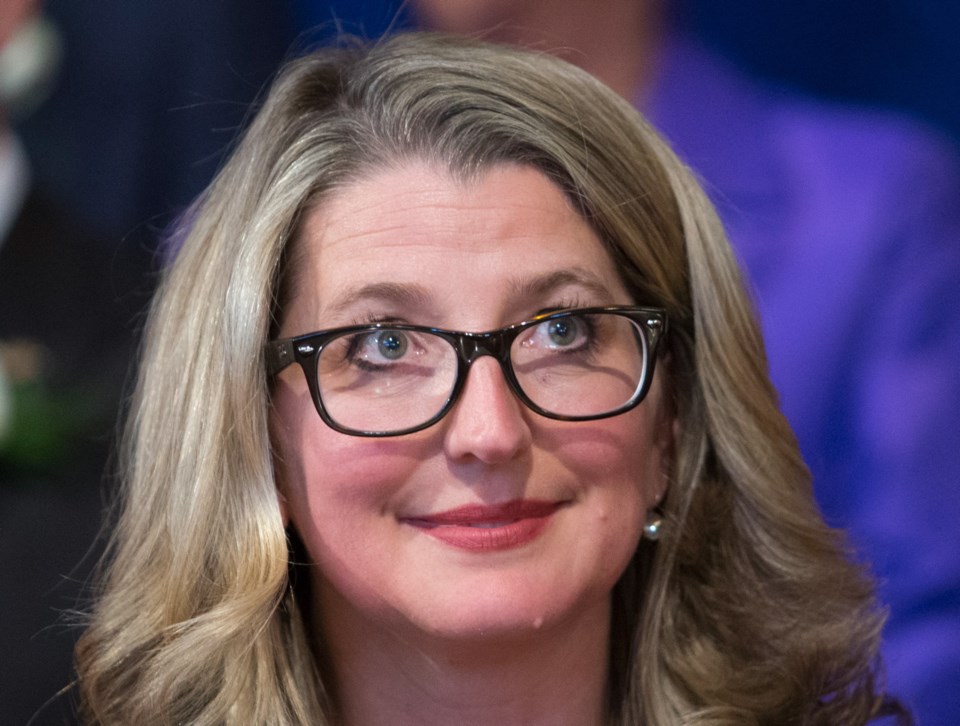An independent review of a B.C. government scientific laboratory for its work on farmed fish concluded Thursday it was operating at a high standard, without any conflicts of interest among its scientists.
The review dismissed concerns raised by Agriculture Minister Lana Popham, who had at first targeted a specific ministry scientist who is disliked by environmental and First Nations activists opposed to open-pen ocean fish farms.
The reviews by Premier John Horgan’s deputy minister, Don Wright, and the independent consulting firm Deloitte failed to back up any of the minister’s concerns and instead gave the Animal Health Centre in Abbotsford a clean bill of health.
“I am satisfied that the Animal Health Centre operates with strong professional, scientific and ethical integrity,” Wright wrote. “My review process found no evidence of ‘dubious data or conflict of interest.’ ”
Wright said he was “impressed with the professionalism, the attention to quality control and the dedication to good science that I observed during my visit.”
Deloitte concluded: “Our independent assessment of the AHC did not identify any evidence of financial or technical conflict of interest regarding the diagnostic activities of the AHC.”
The core of Popham’s concerns appeared to be a dispute between a federal fish scientist, Kristi Miller, and a B.C. lab scientist, Gary Marty, over whether the B.C. lab had properly diagnosed farmed-fish diseases that are a threat to wild salmon, and whether the lab’s additional work doing fee-for-service tests for private fish companies put the lab’s science into disrepute.
The two reviews dismissed those concerns. Deloitte’s report said that while a lab that does additional paid work for the private sector might appear at first glance to be a conflict, “this is normal practice in almost all veterinary diagnostic laboratories across North America.”
Wright concluded: “I am not troubled by a dispute between two government scientists. At a fundamental level, this means they are doing their job.”
Popham called the review “a good news story in the end” and the $100,000 cost of the review “money worthwhile spending.”
She said the government will follow the report’s nine recommendations. The recommendations in the report are prefaced by repeated statements that no wrongdoing of any kind was found.
Popham cited the CTV news program W5 for airing an interview in October with Miller, who accused Marty of conflict of interest. That was echoed by environmentalists who expressed similar concerns about B.C.’s science. Popham was also briefed by Miller before expressing public concern about the government lab.
“When our lab was discredited on national television, it’s something that we took very seriously,” Popham said Thursday. “We have now shown there is no conflict of interest.”
The Deloitte report recommended federal Fisheries, B.C. and the fish-farm industry work together to better define the characteristics of fish disease HSMI (heart and skeletal muscle inflammation) that environmental groups have said is spread from farmed fish to the wild population and threatens B.C. salmon.
It dismissed accusations from environmentalists that B.C. has deliberately ignored evidence of HSMI in coastal fish.
“In addition to the depth of professional expertise, we observed a sophisticated system of quality management processes, technical reviews, separation of roles, and quality audit controls that would make collusion or deliberate alteration of diagnostic results very difficult to disguise,” said the report. “It is unlikely that all of these AHC diagnostic processes would fail to correctly identify pathogens or evidence of disease within a fish sample.”
Popham said one of the recommendations will involve stronger conflict guidelines, including banning B.C. scientists from having travel and accommodation paid by private groups if they are asked to speak at outside events. B.C. will cover the costs instead, which will add $15,000 to the ministry budget, she said.
The reviews were launched in October, after Popham found herself under heavy criticism for sending a letter to coastal fish farm company Marine Harvest that expressed concern it had restocked its open-pen salmon stock and warned that its provincial tenures would soon be up for renewal by her government. The letter was widely viewed as a threat, and the Opposition Liberals accused Popham of being an activist minister because of her past work with environmentalists to oppose fish farms.



